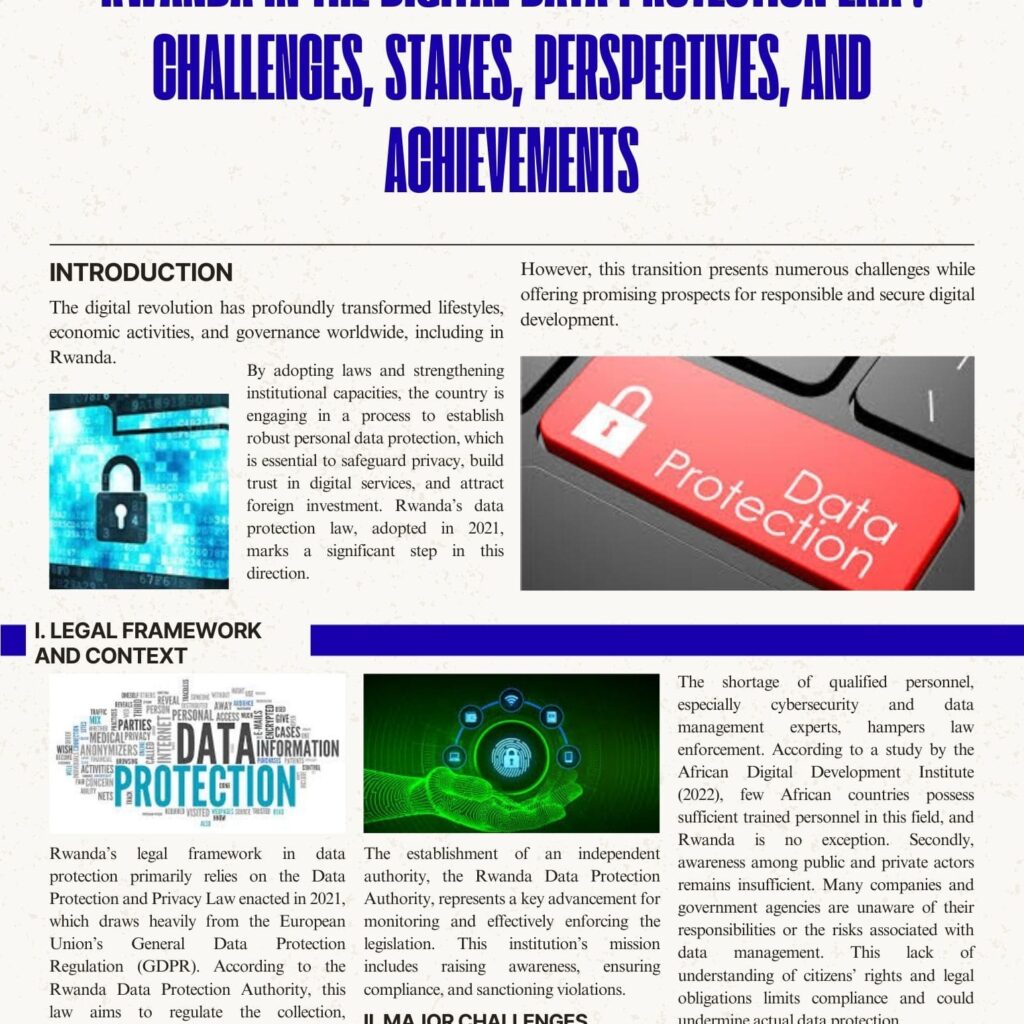INTRODUCTION
The digital revolution has profoundly transformed lifestyles, economic activities, and governance worldwide, including in Rwanda. By adopting laws and strengthening institutional capacities, the country is engaging in a process to establish robust personal data protection, which is essential to safeguard privacy, build trust in digital services, and attract foreign investment. Rwanda’s data protection law, adopted in 2021, marks a significant step in this direction. However, this transition presents numerous challenges while offering promising prospects for responsible and secure digital development.
- LEGAL FRAMEWORK AND CONTEXT
Rwanda’s legal framework in data protection primarily relies on the Data Protection and Privacy Law enacted in 2021, which draws heavily from the European Union’s General Data Protection Regulation (GDPR). According to the Rwanda Data Protection Authority, this law aims to regulate the collection, processing, storage, and deletion of personal data, while ensuring transparency and accountability among stakeholders (Rwanda Data Protection and Privacy Law, 2021). The establishment of an independent authority, the Rwanda Data Protection Authority, represents a key advancement for monitoring and effectively enforcing the legislation. This institution’s mission includes raising awareness, ensuring compliance, and sanctioning violations.
II. MAJOR CHALLENGES
Despite these legislative advances, effective implementation of data protection in Rwanda faces several obstacles. Firstly, institutional capacity remains limited. The shortage of qualified personnel, especially cybersecurity and data management experts, hampers law enforcement. According to a study by the African Digital Development Institute (2022), few African countries possess sufficient trained personnel in this field, and Rwanda is no exception. Secondly, awareness among public and private actors remains insufficient. Many companies and government agencies are unaware of their responsibilities or the risks associated with data management. This lack of understanding of citizens’ rights and legal obligations limits compliance and could undermine actual data protection.
Furthermore, infrastructure security poses a significant technical challenge. The increasing frequency of cyberattacks, such as ransomware and intrusions, threatens data confidentiality and integrity. According to the report by Rwanda’s National Cybersecurity Agency (2023), the sector remains vulnerable, requiring substantial investments to enhance system resilience. Additionally, harmonizing data protection laws with other legislation such as those governing e-commerce or cybersecurity necessitates legal coordination to prevent inconsistencies or gaps.
III. KEY STAKES
Data protection in Rwanda encompasses fundamental stakes, both in terms of rights and economic development. On the rights front, safeguarding privacy and freedom of expression for citizens becomes a priority, especially as digital platforms play an increasing role in daily life. The African Convention on Cybersecurity and Personal Data Protection (2020), to which Rwanda is a party, emphasizes respecting these rights within regional cooperation frameworks (African Union, 2020).
Economically, securing data acts as a catalyst for attracting foreign investments and fostering innovation. The growth of the ICT sector, which significantly contributes to Rwanda’s GDP, hinges on user and partner confidence. A comprehensive legal framework reassures investors and encourages the emergence of innovative startups in the digital space (World Bank, 2022). Sovereign control over sensitive data is also a strategic issue, enabling the country to maintain independence amid geopolitical challenges and strengthen national security.
IV. PERSPECTIVES
Rwanda demonstrates a strong commitment to improving data protection through various strategies. Continuous training of public and private actors is prioritized, often through partnerships with regional and international institutions such as the African Union or the European Union. Regional and international cooperation facilitates the exchange of best practices, resource sharing, and technical capacity building. For instance, Rwanda actively participates in the African Cybersecurity Initiative, aimed at harmonizing standards and fostering collective resilience (African Union, 2021).
Moreover, Rwanda plans to integrate data protection into all its digital transformation strategies, including the National Digital Transformation Plan (2020-2025). Raising awareness among citizens and businesses through educational campaigns is also critical to fostering a culture of digital security. Finally, establishing more effective monitoring and sanction mechanisms will serve to deter violations.
V. ACHIEVEMENTS
Several concrete initiatives demonstrate Rwanda’s dedication to this path. The establishment of the Rwanda Data Protection Authority in 2022 marked a vital milestone, empowering it to oversee compliance and promote awareness. The legislation provides for penalties in cases of violations, including fines up to 1 million Rwandan francs (approximately USD 1,000). Additionally, awareness campaigns have been launched to inform citizens of their rights and obligations regarding personal data management.
Regionally, Rwanda has signed agreements with neighboring countries to harmonize standards and facilitate cross-border data flows. Participation in initiatives such as the “African Cybersecurity Summit” has strengthened cooperation and facilitated knowledge sharing, contributing to regional integration (Ministry of Technology and Innovation of Rwanda, 2022). Several pilot projects, particularly in health and education sectors, have tested compliant data management solutions, illustrating Rwanda’s proactive approach.
CONCLUSION
By engaging in robust digital data protection measures, Rwanda aims to create a safe, fair, and innovative digital environment. While significant challenges remain especially in technical capacity building and awareness, recent legislative and institutional advancements reflect a positive momentum. The complementary efforts of legislation, regional cooperation, and capacity development form a solid foundation to address future challenges and ensure responsible digital growth. Rwanda’s trajectory in this field exemplifies its ambition to become a regional model for responsible data management in the digital age.


